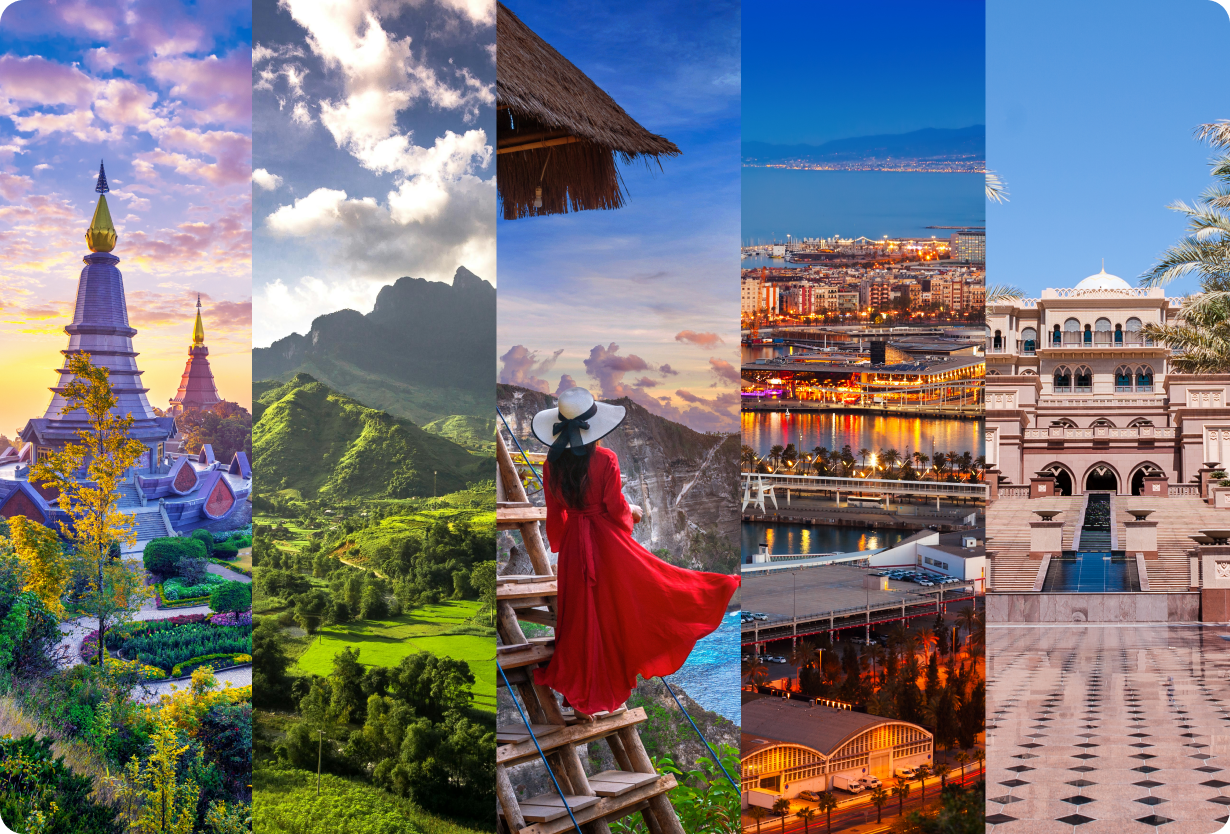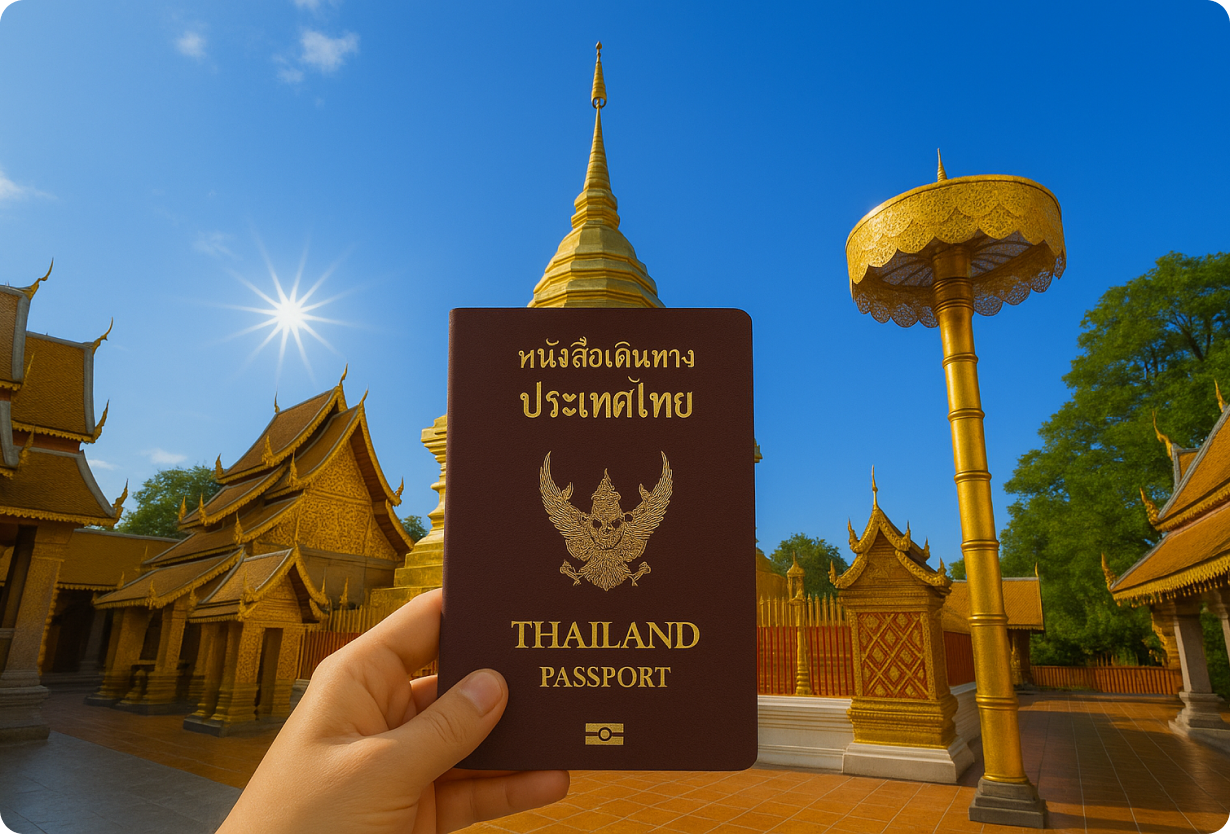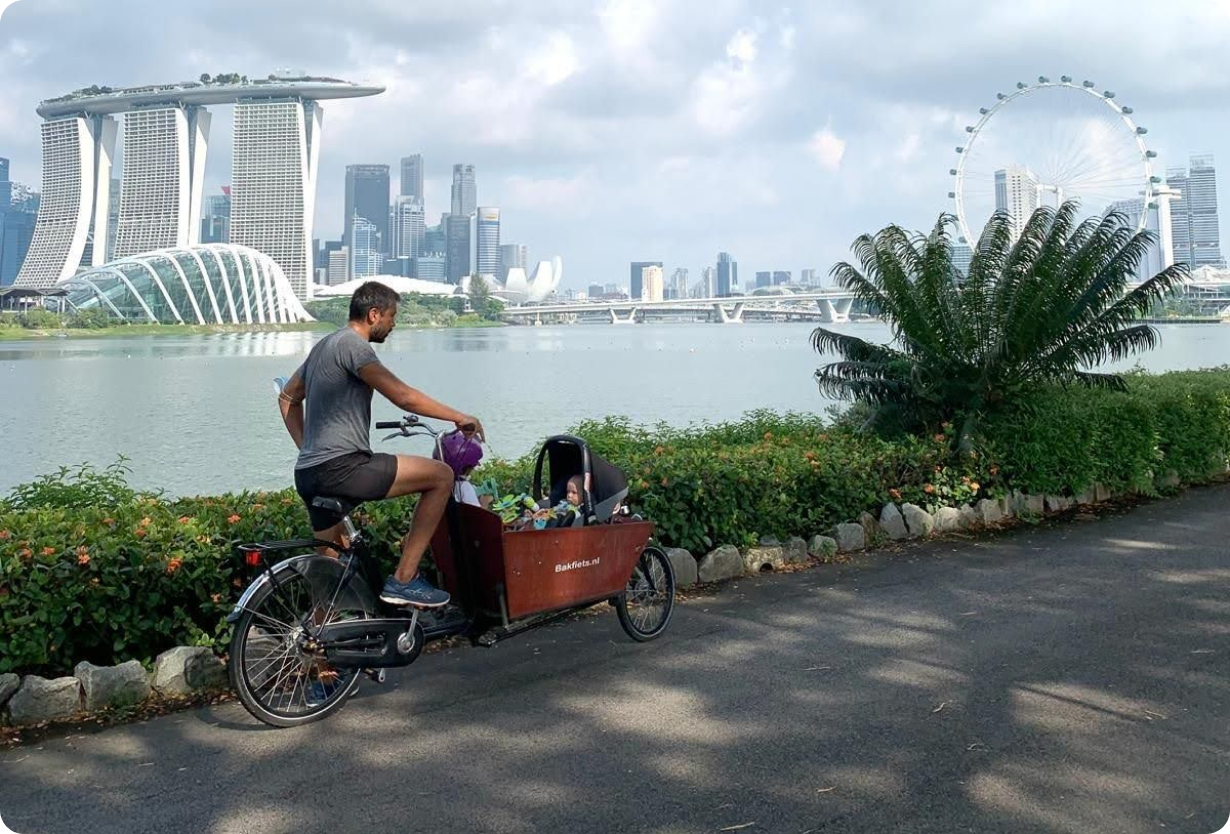
Table of Contents
- Quick Overview: DTV Visa Summary
- What is Thailand's DTV Visa?
- Eligibility Requirements for 2025
- Who Qualifies for the DTV Visa?
- Required Documentation
- The Application Process
- Timeline and Processing
- Tax Implications for DTV Holders
- Extensions and Renewals
- DTV vs. Other Thai Visa Options
- Strategic Considerations for Success
- Common Pitfalls to Avoid
- Costs and Budgeting
- Future Outlook
- Challenges
- Frequently Asked Questions
- Future Outlook
- Conclusion
Last updated: 19th May, 2025
Thailand’s Destination Thailand Visa (DTV) has emerged as one of Southeast Asia’s most attractive visa options for digital nomads and remote workers since its introduction in July 2024. With its 5-year validity and flexible stay requirements, this visa represents a significant shift in how countries approach the growing remote work economy.
As someone who has navigated complex visa systems across multiple jurisdictions, I find Thailand’s approach with the DTV compelling. Unlike traditional investment-based programs that require substantial capital deployment, the DTV focuses on income verification and genuine remote work arrangements – making it accessible to a broader range of internationally mobile professionals.
In this comprehensive guide, I’ll walk you through everything you need to know about the DTV Visa for 2025, from eligibility criteria to strategic considerations that can significantly improve your chances of approval.
Thinking of relocating to Thailand?
A free call with our relocation expert will give you a clear path forward – no stress, just answers.
Quick Overview: DTV Visa Summary
| Feature | Details |
|---|---|
| Initial Investment | No capital investment required |
| Financial Requirement | 500,000 THB (~$14,400 USD) bank balance |
| Processing Time | 1-4 weeks (varies by consulate) |
| Initial Validity | 5 years (multiple entry) |
| Stay Duration | 180 days per entry (extendable to 360 days) |
| Path to Citizenship | None |
| Family Inclusion | Yes (spouse and children under 20) |
| Stay Requirement | No minimum stay required |
What is Thailand’s DTV Visa?
The Destination Thailand Visa is a multiple-entry visa valid for 5 years that specifically targets professionals who earn income from outside Thailand. Known informally as Thailand’s “digital nomad visa,” it allows holders to stay up to 180 days per entry, with the option to extend once for an additional 180 days.
The DTV serves two primary purposes:
- Attracting remote workers
- Promoting Thai “soft power” activities
This dual approach reflects Thailand’s strategy to boost both economic and cultural exchanges with international visitors.
Unlike traditional tourist visas that require frequent border runs, or expensive investment visas that demand substantial capital commitments, the DTV offers a middle ground.
Eligibility Requirements for 2025
To qualify for the DTV, you must meet several key requirements:
Basic Requirements
- Minimum age: 20 years old
- Valid passport with at least 6 months validity and 2 blank pages
- No overstay history in Thailand
- Clean criminal record
- Intention to work remotely or participate in Thai cultural activities
Financial Requirements
The DTV requires proof of financial stability through:
- Bank balance of 500,000 THB (~$14,400 USD)
- Funds maintained for at least 3 months before application
- Additional 500,000 THB required for each dependent
These amounts are fixed in Thai Baht but most consulates accept equivalent amounts in major currencies like USD, EUR, or GBP.
Accommodation Requirements
You must demonstrate accommodation arrangements in Thailand:
- Rental agreement (minimum 6 months recommended)
- Hotel booking confirmation (for cultural activity participants)
- Property ownership documents
- Letter of invitation from a Thai resident
Health Insurance
Valid health insurance coverage is mandatory:
- Minimum coverage: 30,000 USD (Schengen standard)
- Must cover emergency medical care and hospitalization
- Valid for at least 12 months from planned arrival
- Repatriation coverage included
Who Qualifies for the DTV Visa?
The DTV accommodates three main categories of applicants:
Digital Nomads and Remote Workers
This category includes:
- Employees of foreign companies with remote work permissions
- Freelancers with international clients
- Online business owners with operations outside Thailand
- Content creators and digital entrepreneurs
Key requirement: You must prove your income comes from sources outside Thailand and that you’re authorized to work remotely.
Thai Soft Power Activities Participants
These programs should last at least six months for best approval chances. Eligible activities include:
- Muay Thai training at registered gyms
- Thai cooking classes
- Traditional Thai medicine treatments
- Educational and cultural workshops
- Medical procedures and wellness programs
Family Members
The DTV allows family reunification for:
- Spouse or civil partner
- Unmarried children under 20 years old
- Each dependent must meet the same financial requirements
Required Documentation
The DTV application requires comprehensive documentation. Here’s what you’ll need:
For Remote Workers/Digital Nomads
- Completed DTV application form
- Valid passport (original and copies)
- Recent passport-sized photographs
- Employment contract or business registration documents
- Bank statements (3-6 months)
- Proof of accommodation in Thailand
- Health insurance policy
- Criminal background check (apostilled)
- Cover letter explaining your remote work situation
For Thai Soft Power Activities
- Completed DTV application form
- Valid passport (original and copies)
- Recent passport-sized photographs
- Bank statements showing required funds
- Proof of enrollment in qualified Thai activity
- Accommodation proof in Thailand
- Health insurance coverage
- Criminal background check (apostilled)
Important Documentation Tips
- All foreign documents must be apostilled or legalized
- Translations must be certified if documents aren’t in English or Thai
- Ensure all names and dates are consistent across documents
- Organize documents in the order requested by your specific consulate
The Application Process
The DTV application process has been streamlined through Thailand’s E-Visa system:
Phase 1: Preparation (2-4 weeks)
Before applying, ensure you:
- Meet all eligibility requirements
- Have maintained the required bank balance for 3+ months
- Secured accommodation proof in Thailand
- Obtained valid health insurance
- Gathered all required documents
Phase 2: Application Submission
You can apply either:
- Online: Through the Thai E-Visa portal (most convenient)
- In-person: At Thai embassies or consulates
The process involves:
- Creating an account on the E-Visa system
- Completing the application form accurately
- Uploading all required documents in specified formats
- Paying the visa fee (10,000 THB)
- Awaiting processing
Phase 3: Processing and Approval
Processing times vary by consulate:
- Most applications: 1-4 weeks
- Peak seasons may extend processing times
- Some consulates offer expedited services
Once approved, you’ll receive your visa electronically or collect your passport in person.
Timeline and Processing
Understanding the timeline helps plan your relocation:
Preparation Phase: 1-2 months
- Document gathering and organization
- Financial requirement compliance
- Accommodation securing
- Health insurance procurement
Processing Phase: 1-4 weeks
- Application submission
- Consulate review
- Potential requests for additional information
- Visa issuance
Entry and Initial Stay: 180 days
- Entry to Thailand with DTV
- 180-day stay permitted
- Option to extend once
Tax Implications for DTV Holders
Thailand’s 2024 tax law changes significantly impact DTV holders:
Tax Residency Rules
- 180-day threshold: Spending 180+ days annually triggers tax residency
- Progressive taxation: 5-35% on taxable income
- Territorial system: Only Thai-sourced income and foreign income remitted to Thailand is taxed
Strategic Considerations
Many DTV holders employ various strategies:
- Staying under 180 days to avoid tax residency
- Using foreign credit cards for Thai expenses
- Keeping foreign income abroad
- Timing fund transfers strategically
Important Note
Pre-2024 foreign earnings remain exempt from Thai taxation when remitted, while income earned after January 1, 2024, becomes taxable if brought into Thailand.
Extensions and Renewals
The DTV allows for straightforward extensions:
Extension Process
- Apply within 30 days before expiration
- Visit any Thai immigration office
- Required documents:
- Passport with entry stamps
- Proof of accommodation
- Financial evidence (500,000 THB)
- Valid health insurance
- Fee: 1,900 THB
- Additional 180 days granted (maximum 360 days total)
Border Runs
After 360 days, you must:
- Exit Thailand temporarily
- Re-enter for a fresh 180-day period
- No waiting period required
- Popular destinations: Malaysia, Cambodia, Vietnam
DTV vs. Other Thai Visa Options
DTV vs. Elite Visa
| Feature | DTV | Elite Visa |
|---|---|---|
| Duration | 5 years | 5-20 years |
| Cost | 10,000 THB | 600,000-5,000,000 THB |
| Work Permission | Remote work only | No work allowed |
| Services | None | VIP services included |
| Requirements | Income verification | No income requirements |
DTV vs. LTR Visa
| Feature | DTV | LTR |
|---|---|---|
| Duration | 5 years | 10 years |
| Investment | None | Varies (200k-500k USD) |
| Work | Remote only | Includes local work |
| Tax Benefits | None | Foreign income exempt |
| Age Requirement | 20+ | 50+ (most categories) |
DTV vs. Tourist Visas
The DTV eliminates the need for constant visa runs required with tourist visas, while providing legal permission for remote work – something tourist visas explicitly prohibit.
Strategic Considerations for Success
Several factors can improve your application’s chances:
Financial Documentation
- Exceed the minimum 500,000 THB requirement by 20-30%
- Ensure bank statements clearly show fund sources
- Maintain consistent balances for the required period
- Provide explanations for any unusual transactions
Consulate Selection
Different consulates may have:
- Varying processing times
- Different document interpretation standards
- Unique requirements not found elsewhere
- Fee variations (some charge more than the standard rate)
Application Timing
Best practices include:
- Avoiding peak holiday periods
- Applying during consulates’ less busy months
- Allowing buffer time before intended travel
- Monitoring processing time trends at your chosen consulate
Common Pitfalls to Avoid
Learn from frequent mistakes:
- Insufficient Financial Proof: Bank statements showing irregular income or unclear fund sources
- Inadequate Accommodation Documentation: Short-term bookings or unclear arrangements
- Missing Apostilles: Failing to properly legalize documents
- Inconsistent Information: Mismatched names or dates across documents
- Last-Minute Applications: Rushing the process leads to errors
- Overlooking Health Insurance Details: Missing repatriation coverage
Costs and Budgeting
Understanding the true cost helps with planning:
Visa Fees
- Application fee: 10,000 THB (~$280)
- Extension fee: 1,900 THB (~$53)
- Some consulates charge more (up to €350)
Additional Costs
- Health insurance: $500-1,500 annually
- Accommodation: Varies significantly by location
- Documentation/translation: $200-500
- Legal consultations: $300-1,000 (if needed)
Monthly Living Costs in Thailand
- Budget living: $800-1,200
- Comfortable lifestyle: $1,500-3,000
- Premium lifestyle: $3,000+
Costs vary dramatically between Bangkok, smaller cities, and rural areas.
Future Outlook
The DTV represents Thailand’s progressive approach to attracting global talent. As the program matures, expect:
Potential Improvements
- Clearer guidance from consulates
- Streamlined renewal processes
- Enhanced digital services
- Possible expansion of eligible activities
Regional Competition
Other ASEAN countries are developing competing programs:
- Malaysia’s upcoming digital nomad visa
- Vietnam’s pilot programs
- Philippines’ enhanced long-term options
Thailand’s first-mover advantage with the DTV positions it well in this competitive landscape.
Challenges
While groundbreaking, the DTV has limitations:
Current Restrictions
- No path to permanent residency
- Prohibition on local employment
- Limited business activities permitted
- No voting rights or civic participation
Administrative Challenges
- Inconsistent requirements across consulates
- Limited official guidance available
- Language barriers at some offices
- Technology dependence for applications
Frequently Asked Questions
Can I work for Thai companies on a DTV?
No. The DTV strictly prohibits local employment. You can only work remotely for foreign entities or run businesses based outside Thailand.
What if I don’t have a formal employment contract?
Freelancers can provide:
- Client contracts and invoices
- Portfolio of work
- Platform profiles (Upwork, Fiverr, etc.)
- Bank statements showing regular income
Can I bring my pet?
Yes, but this requires separate pet import procedures. The DTV doesn’t specifically address pets – you’ll need to follow Thailand’s standard pet import requirements.
What happens if I overstay?
Overstaying can result in:
- Daily fines (500 THB per day)
- Entry bans for repeat offenders
- Visa cancellation
- Legal complications for future applications
Can I apply for a DTV while in Thailand?
No. You must apply from outside Thailand at a Thai embassy or consulate.
Is health insurance mandatory?
Yes. You must have coverage meeting Schengen standards (minimum 30,000 USD) including emergency care, hospitalization, and repatriation.
Future Outlook
The DTV represents Thailand’s commitment to attracting global talent. Looking ahead:
Expected Improvements
- Clearer guidance from consulates worldwide
- Streamlined renewal processes
- Enhanced digital services
- Possible expansion of eligible activities
Regional Competition
As other ASEAN countries launch competing programs:
- Malaysia’s Digital Nomad Pass
- Philippines’ enhanced visas
- Vietnam’s pilot programs
Thailand’s first-mover advantage with the DTV positions it well in this competitive landscape.
Long-term Considerations
While the DTV doesn’t lead to permanent residency, many holders use it as:
- A stepping stone to other visa types
- A way to establish business connections
- An opportunity to learn Thai culture/language
- A test period before committing to permanent relocation
Conclusion
Thailand’s DTV Visa represents a significant evolution in how countries approach the digital nomad economy. Its combination of accessibility, legitimacy, and flexibility makes it an attractive option for remote workers seeking a stable base in Southeast Asia.
Success with the DTV requires careful preparation, strategic thinking, and understanding of both the opportunities and limitations it presents. While the application process is generally straightforward, attention to detail in documentation and compliance with requirements is crucial.
For those ready to embrace the challenges and opportunities of international living, Thailand’s DTV offers a compelling pathway to establish a presence in one of Asia’s most dynamic economies. The key is approaching it not just as a visa, but as a tool for building a sustainable, location-independent lifestyle.
As global mobility continues evolving, programs like the DTV will likely become the norm rather than the exception. Thailand has positioned itself as a leader in this transformation, creating a template that other nations will undoubtedly study and adapt.
Thinking of relocating to Thailand?
A free call with our relocation expert will give you a clear path forward – no stress, just answers.





